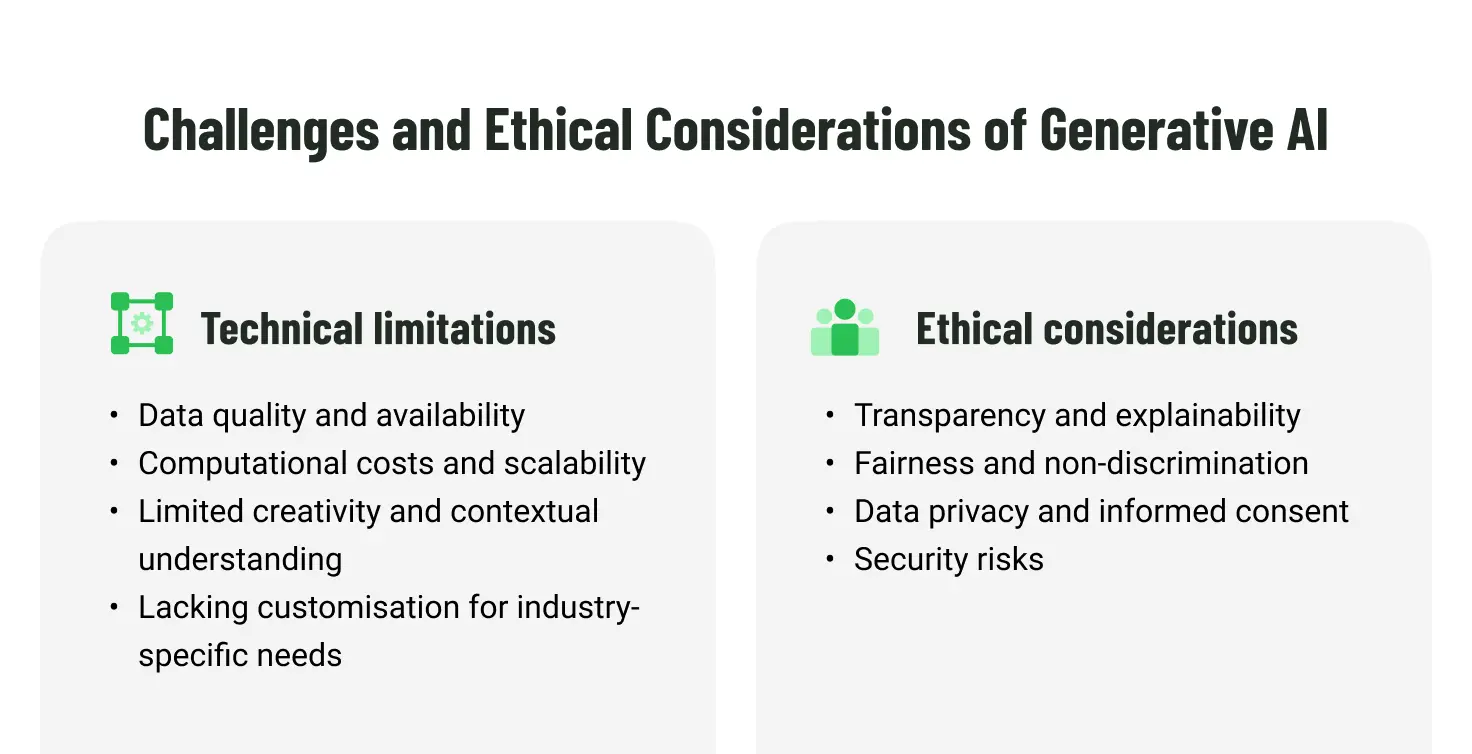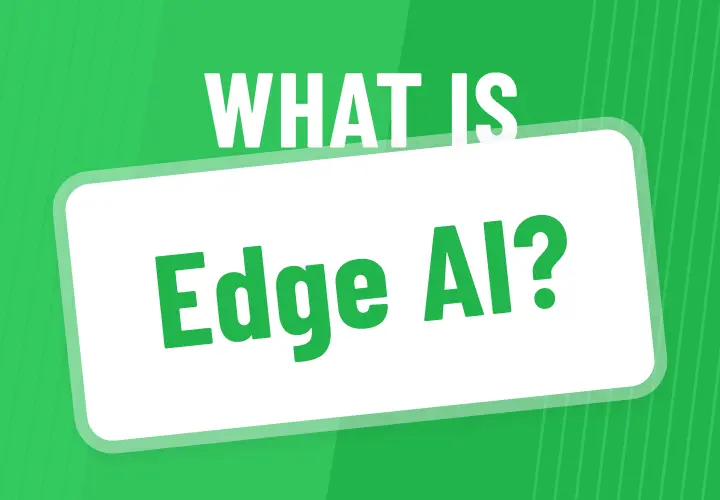Future of Generative AI in App Development: Trends & Challenges
Table of contents
- Key Generative AI Trends for 2025-2030 in Mobile App Development
- Market growth and investment
- Technological breakthroughs
- Integration with emerging technologies
- Shifting development paradigms
- Key Generative AI trends for 2025-2030 in mobile app development
- Challenges and Ethical Considerations of Generative AI
- Technical limitations
- Ethical considerations
- Challenges and ethical considerations of Generative AI in mobile app development
Conclusion: Generative AI and the New Era of Mobile App Development
Generative AI is no longer an emerging technology; it’s the next digital infrastructure. As we look toward 2025 and beyond, it’s clear that Generative AI will be central to how mobile apps are developed, deployed, and experienced. With billions in investment, rapid advances in autonomous agents, and deeper integration with AR, VR, and IoT, the mobile landscape is on the brink of transformation.
This article explores the key trends shaping the next era of AI-driven innovation and what businesses must do today to stay ahead tomorrow.
Key Generative AI Trends for 2025-2030 in Mobile App Development
The role of Generative AI in mobile app development is rapidly evolving from a promising toolset to a foundational driver of innovation. Between 2025 and 2030, the market is expected to experience exponential growth, fueled by multi-billion-dollar investments from tech giants and startups alike. Mobile development will be profoundly reshaped as breakthroughs in multimodal models, synthetic data generation, and autonomous agents accelerate. Generative AI will increasingly intersect with emerging technologies such as augmented reality, IoT, and edge computing to deliver more intelligent, personalized, and context-aware experiences. This evolution marks a fundamental shift from traditional development cycles to AI-driven co-creation, where code, design, and UX converge more seamlessly.
Market growth and investment
The overall AI market is projected to surge from roughly $372 billion in 2025 to $2.4 trillion by 2032, indicating that AI app development will become a top priority for app development companies. PwC estimates that AI's cumulative boost to global GDP will reach $15.7 trillion by 2030. The mobile AI market is projected to surge from $8.56 billion in 2020 to $84.8 billion by 2030, exhibiting a remarkable CAGR of 26.44%.
The projected surge in the mobile AI market indicates that companies not investing in Generative AI for mobile apps risk a significant competitive lag. This means a massive influx of capital and innovation into this sector. Companies that fail to integrate Generative AI into their mobile strategy will find their apps becoming "static in a market that demands motion", leading to decreased user engagement, increased churn, and ultimately, loss of market share. This creates an imperative for businesses to adopt Generative AI not just as a feature, but as a core strategic direction. This market growth will lead to a scramble for AI developers and a consolidation of AI-powered platforms and tools, making strategic partnerships with AI development companies crucial.
Technological breakthroughs
- Autonomous AI agents: These will become much more common, with 41% of businesses predicting that up to half of their core business processes will run on AI agents by 2025, and over half by 2027. This signifies a smooth transition from general AI use to carefully implemented autonomous agents in foundational infrastructure.
- Generative AI will be everywhere: It's not just a trend but a fundamental tool. AI models will become commodities, making advanced AI capabilities more accessible.
- Artificial emotional intelligence: The rise of AI capable of understanding and responding to human emotions will lead to more empathetic and engaging app interactions.
The commoditization of AI models and the rise of autonomous AI agents suggest a future where sophisticated AI capabilities are readily available and can operate with minimal human intervention. This lowers the barrier to entry for incorporating advanced AI into applications. While commoditization makes AI more pervasive, the true competitive advantage will shift from simply having AI to effectively training, fine-tuning, and integrating these commoditized models for specific, nuanced use cases. The focus will move from raw AI power to data quality, ethical deployment, and the ability to combine various AI agents to solve complex problems. This also implies a greater need for robust AI governance and oversight. This could lead to a proliferation of highly specialized AI applications, as core AI components become "plug-and-play." It also means the "secret sauce" will lie in proprietary data and the unique ways companies combine and apply AI, not just in the AI models themselves.
Integration with emerging technologies
- Augmented Reality and Virtual Reality: No longer just for gaming, AR/VR will create immersive, interactive experiences in mobile apps for retail, tourism, education, and more, boosting user engagement. Generative AI can generate 3D models from text descriptions for VR/AR.
- Internet of Things integration: Apps like Tesla and Nest already manage smart devices. Generative AI will enhance these by providing predictive analytics and intelligent automation based on real-time IoT data.
- Super apps: Generative AI will amplify the trend towards "super apps" that consolidate multiple services (e.g., checking car battery, setting home temperature), enabling seamless, personalized experiences across diverse functionalities.
Integrating Generative AI with AR/VR promises to create "immersive experiences that blend the virtual and physical worlds", fundamentally changing how users interact with digital content and real-world environments. This moves mobile interaction beyond flat screens into interactive, spatial computing. This will unlock entirely new categories of mobile applications, such as hyper-realistic virtual try-ons for retail, interactive educational simulations, and dynamic navigational overlays in tourism. Generative AI's ability to generate realistic virtual content on the fly will make these experiences highly dynamic and personalized, blurring the lines between digital and physical. It also raises new challenges for content moderation and ethical use in immersive environments. The mobile app, as we know it, may evolve into a "mobile experience platform" that leverages various sensory inputs and outputs, with Generative AI as the core engine for interactive content generation.
Shifting development paradigms
- Low-code/no-code development: These platforms democratize app design, allowing individuals without deep coding knowledge to create applications. Generative AI will accelerate this by automatically generating complex components, making app creation more accessible.
- Cross-platform development: Using a single codebase for multiple platforms (iOS, Android, web) saves time and money. Generative AI can enhance this by generating platform-specific adaptations or optimizing code for different environments.
- AI-powered QA automation: AI is transforming software testing by automating test case generation, identifying bugs, and suggesting fixes. This reduces manual bug hunting and improves app quality.
The rise of low-code/no-code platforms coupled with Generative AI will significantly broaden the pool of app creators, moving app development beyond traditional programming roles. This means more individuals can build applications without extensive technical backgrounds. This "democratization of app development" could lead to an explosion of niche applications tailored to particular needs or communities, as the barrier to entry for development lowers. It could also shift the focus of professional developers towards building the underlying AI models and low-code platforms themselves, rather than individual applications. Quality control and security for these AI-generated, low-code apps will become critical concerns. The app ecosystem may become more diverse and dynamic, with innovations emerging from unexpected sources, forcing traditional app development agencies to adapt their business models.
Key Generative AI trends for 2025-2030 in mobile app development
| Trend Category | Specific Trend | Description/Impact |
| Market Dynamics | Explosive growth of the AI and AI-powered mobile app market. | AI has become a top priority; companies that do not invest in AI risk losing competitiveness. |
| Core AI Advancements | Proliferation of autonomous AI agents. | AI agents will handle up to half of core business processes, necessitating infrastructure changes. |
| Core AI Advancements | Commoditization of AI models. | Advanced AI capabilities become more accessible, but the competitive edge shifts to effective integration and fine-tuning. |
| Core AI Advancements | Development of artificial emotional intelligence. | Leads to more empathetic and engaging app interactions. |
| Integration with Other Technologies | Deep integration with AR/VR. | Creates immersive, interactive experiences blurring lines between digital and physical worlds. |
| Integration with Other Technologies | Enhanced IoT integration. | Smart apps will leverage predictive analytics and automation based on real-time IoT data. |
| Integration with Other Technologies | Rise of super apps. | Generative AI enables seamless, personalized experiences across multi-functional apps. |
| Development Methodologies | Democratization through Low-Code/No-Code. | Broadens app creator base, accelerates development via automated component generation. |
| Development Methodologies | AI-enhanced Cross-Platform Development. | Generates platform-specific adaptations and optimizes code for diverse environments. |
| Development Methodologies | AI-Powered QA Automation. | Transforms testing, automates test cases, identifies bugs, and improves app quality. |
We're witnessing a structural shift in mobile app development, where Generative AI is not just enhancing productivity, it's reshaping the entire innovation cycle," says Eric Johnson. "From commoditized models and autonomous agents to immersive spatial computing and democratized development, the next wave of mobile apps will be built as much by domain experts and creators as engineers. The winners in this race will be those who combine AI integration with ethical foresight, cross-disciplinary collaboration, and a deep understanding of user behavior in a hybrid digital-physical world.
Challenges and Ethical Considerations of Generative AI
While Generative AI holds immense promise, its widespread adoption in mobile app development comes with significant technical hurdles and critical ethical implications that must be addressed.

Technical limitations
- Data quality and availability: Generative AI models are only as good as the data they are trained on. A huge hurdle is obtaining diverse, high-quality, error-free, and relevant datasets. Bias or inconsistencies in training data can lead to inaccurate or biased outputs.
The critical reliance on "high-quality data" for effective Generative AI implies that data governance and curation will become a highly specialized and vital role in app development. Companies must invest significantly in data collection, cleaning, and structuring. Furthermore, developing robust data pipelines and ethical data acquisition practices will become a competitive advantage. Companies with superior, proprietary datasets will have a significant edge in developing high-performing Generative AI-powered apps. This could lead to new business models focused on providing and curating data for AI training and increased scrutiny on how companies acquire and manage user data. - Computational costs and scalability: Training and deploying complex Generative AI models require significant computational power, cutting-edge hardware, and substantial financial investment. This creates a barrier for startups and mid-sized enterprises. Scaling AI applications to handle large volumes of data and thousands of users can lead to latency issues and requires additional resources.
The "high computational costs and scalability issues" create a potential barrier to entry for smaller players, leading to a concentration of advanced Generative AI capabilities among large tech companies. This means that only well-funded companies can afford to develop and scale cutting-edge Generative AI models. This could lead to an oligopoly in advanced AI app development, where large companies dominate due to their infrastructure advantages. Smaller enterprises may rely on third-party AI services or open-source models offering less customization or control. This creates a strategic imperative for smaller players to focus on niche applications or innovative integration of existing AI models. This dynamic could influence market consolidation, with smaller AI startups being acquired by larger companies seeking to gain a technological edge. - Limited creativity and contextual understanding: While Generative AI can produce coherent content, it struggles to replicate true human creativity, intuition, emotional depth, or abstract thinking. It may fail to understand complex contexts involving ironic meanings, professional terminology, or human social customs, leading to incorrect or generic outputs.
The "limited creativity and contextual understanding" of Generative AI means that human oversight and "human-in-the-loop" models will remain essential for creating truly compelling and nuanced mobile app experiences. This implies that AI-generated content or designs might be generic or misinterpret user intent. This necessitates a hybrid approach where AI performs the heavy lifting of generation, but human experts refine, curate, and inject the necessary emotional depth, cultural understanding, and nuanced creativity. This shifts the human role from creation to curation and enhancement, ensuring high-quality, engaging outputs that resonate with users. The future of app development will likely be a symbiotic human-AI relationship rather than full automation, emphasizing the importance of interdisciplinary teams. - Limited customization for industry-specific needs: Off-the-shelf AI models trained on broad datasets may not align with the unique requirements of different industries. This can lead to generalized insights not specialized enough for particular fields.
The "limited customization for industry-specific needs" challenge implies a growing demand for specialized, fine-tuned AI models and proprietary datasets within niche mobile app markets. Companies developing mobile apps for specialized sectors (e.g., healthcare, finance, manufacturing) must invest in fine-tuning AI models with their own proprietary, high-quality data. This creates a competitive barrier, as the value lies in the AI model and the unique, specialized data it's trained on. This will also drive partnerships with AI development companies specializing in tailored solutions. The market may see a rise in highly specialized AI service providers and data aggregators catering to specific industry verticals, making "data ownership" and "industry expertise" critical assets.
Ethical considerations
- Transparency and explainability: Developers must indicate when content is AI-generated. To build user trust, AI systems should provide traceable logic or justifications, especially in high-stakes decision-making contexts. Understanding how AI arrives at its conclusions can be perplexing.
The challenge of "interpretability and transparency" for Generative AI in mobile apps is crucial for building and maintaining user trust, especially as AI becomes more integrated into sensitive applications. The opacity of AI decisions can lead to users being hesitant to adopt apps where the AI's logic is unclear. This necessitates the development of "explainable AI" (XAI) methods within mobile apps, where the AI provides justifications or confidence scores for its outputs (e.g., "This recommendation is based on your past purchases and similar user behavior"). Such transparency is vital for critical applications like healthcare or finance, where incorrect AI decisions could have severe consequences. It also aids in debugging and improving AI models. Regulators will likely introduce stricter AI transparency requirements, leading to new compliance standards for mobile app developers. Companies that prioritize explainability will gain a significant trust advantage. - Fairness and non-discrimination (Bias): Generative AI models must be trained on diverse and representative datasets to avoid perpetuating harmful biases related to race, gender, culture, or socio-economic status. Regular auditing and testing are crucial to detect and mitigate algorithmic bias.
The risk of Generative AI perpetuating "harmful biases related to race, gender, culture, or socio-economic status" means that ethical AI development is not just a moral imperative but a business necessity to prevent reputational damage and legal repercussions. Bias in training data leads to biased AI outputs. Biased applications can result in discrimination, poor user experiences for certain groups, and public backlash. This necessitates a proactive and continuous approach to "ethical AI practices", including diverse data collection, bias detection tools, and regular audits throughout the AI lifecycle. Companies must invest in interdisciplinary teams (AI ethicists, social scientists) to identify and mitigate bias, ensuring their applications are fair and inclusive. Failure to do so can lead to significant brand damage, user churn, and potential lawsuits. "Ethical AI and Responsible App Development" will become a key differentiator and a core component of corporate social responsibility, influencing consumer choice and regulatory frameworks. - Data privacy and informed consent: Generative AI must use data ethically sourced with explicit consent, and systems must not produce outputs that compromise individual privacy. Techniques like differential privacy and federated learning can further enhance data protection.
The imperative for "transparent data practices building consumer trust" in Generative AI-powered mobile apps suggests that privacy-by-design will become an inherent standard, moving beyond mere compliance to a competitive advantage. Generative AI requires vast amounts of data, raising significant privacy concerns. Users are increasingly wary of how their data is used. Companies must implement robust data governance frameworks, prioritize privacy-enhancing technologies (like differential privacy and federated learning), and communicate data usage policies to users. Building trust through transparent and secure data practices will be paramount for user adoption and retention, especially as the regulatory environment tightens. Apps that mishandle data or lack transparency will face severe penalties and user backlash. This will drive innovation in privacy-preserving AI techniques and potentially lead to new business models centered around user-controlled data or privacy-first AI services. - Security risks (e.g., deepfakes, misinformation): Generative AI can create synthetic media (deepfakes) for misinformation, manipulation, or harassment. AI models can also spread inaccurate details or fabricate lies. Rigorous testing for vulnerabilities like adversarial prompts and misinformation generation is essential.
The potential for Generative AI to create "deepfakes" and spread "misinformation" presents a significant societal risk that mobile app developers must actively mitigate, extending beyond technical development to broader social responsibility. Generative AI can create fabricated content that spreads misinformation. This can harm individuals, manipulate public opinion, and erode trust in digital content. Mobile app developers must implement stringent content moderation, prompt filtering, and authentication mechanisms (e.g., watermarking for AI-generated content) to prevent the misuse of their platforms. This expands the developer's responsibility beyond functional performance to the ethical impact of content generated or disseminated through their apps. It also necessitates collaboration with policymakers to establish clear guidelines and regulations. The industry may see the emergence of AI services and "truth-checking" technologies designed to detect deepfakes and misinformation, creating a new arms race between generation capabilities and detection mechanisms.
Challenges and ethical considerations of Generative AI in mobile app development
| Category | Specific Challenge/Concern | Impact/Risk | Mitigation Strategy |
| Technical Challenges | Data Quality and Availability | Inaccurate or biased outputs, limited AI performance. | Collect and curate high-quality, diverse, error-free data; invest in data infrastructure. |
| Technical Challenges | Computational Costs and Scalability | High barriers to entry, performance issues with user growth. | Optimize models, leverage cloud solutions, and strategic partnerships. |
| Technical Challenges | Limited Creativity and Contextual Understanding | Generated content may be generic, lack depth, or misinterpret intent. | Human-in-the-loop hybrid approach, fine-tune models, specialized datasets. |
| Technical Challenges | Limited Customization for Industry-Specific Needs | Ineffective or irrelevant solutions for niche markets. | Develop custom AI models and fine-tune them with proprietary data. |
| Ethical Considerations | Transparency and Explainability | User distrust, debugging difficulties, lack of accountability. | Clearly indicate AI-generated content and develop Explainable AI (XAI). |
| Ethical Considerations | Fairness and Non-discrimination (Bias) | Discrimination, reputational damage, and legal repercussions. | Train on diverse data, conduct regular bias audits, and follow ethical AI practices. |
| Ethical Considerations | Data Privacy and Informed Consent | Privacy breaches, loss of user trust, legal penalties. | Ethical data sourcing, explicit consent, privacy-enhancing technologies (e.g., differential privacy). |
| Ethical Considerations | Security Risks (Deepfakes, Misinformation) | Spread of false information, manipulation, and individual harm. | Rigorous testing, content moderation, prompt filtering, and deepfake detection technologies. |
Conclusion: Generative AI and the New Era of Mobile App Development
Generative AI represents a tectonic shift in how mobile applications are envisioned, built, and experienced. From automating development tasks and accelerating time to market to elevating creativity and delivering real-time personalized user experiences, Generative AI is redefining the mobile app paradigm at every layer.
The projected growth of the mobile app economy, which is set to exceed $2.2 trillion in revenue by 2030, underscores the urgency for businesses to embed AI as a foundational pillar, not a peripheral tool. Mobile apps of the near future will no longer merely respond to user inputs; they will anticipate, guide, and adapt to user behaviors in real time, ushering in a new era of predictive, hyper-personalized, and emotionally resonant digital experiences.
Yet, this transformation is not without its complexities. Technical hurdles such as data quality, scalability, and model limitations remain formidable. More importantly, the ethical dimensions, including bias mitigation, privacy preservation, transparency, and security, demand rigorous attention. Generative AI, if implemented without ethical foresight, risks undermining the very trust it seeks to enhance.
To navigate this evolving landscape, businesses and developers must adopt a holistic, future-proof strategy:
- Adopt an AI-first mindset: Treat Generative AI as a strategic core, not a feature. This requires organization-wide upskilling, AI literacy across disciplines, and a cultural shift toward experimentation and AI-driven innovation.
- Build robust data foundations: The competitive edge will be those who master data management and governance - collecting, curating, and protecting high-quality, diverse, and proprietary datasets to fuel more accurate, relevant, and ethical AI models.
- Balance automation with human creativity: True innovation will emerge from collaborative intelligence, pairing AI’s scale and speed with human empathy, judgment, and contextual awareness to create deeply engaging and culturally sensitive mobile experiences.
- Embed ethics by design: Ethical AI is no longer optional. Establish transparent, accountable frameworks to safeguard privacy, mitigate bias, and ensure fair outcomes, particularly in sensitive domains like healthcare, finance, or education.
- Stay agile in a rapidly evolving ecosystem: The pace of advancement in AI technologies, regulatory landscapes, and consumer expectations requires continuous learning, adaptive thinking, and strategic flexibility.
- Leverage strategic partnerships: For organizations lacking internal AI capabilities, collaborating with specialized Generative AI partners can accelerate implementation, mitigate risks, and ensure access to best-in-class expertise.
In essence, the future of mobile development will be shaped not just by how well companies harness Generative AI’s capabilities, but by how responsibly and strategically they align these innovations with human needs, ethical principles, and long-term value creation.
The mobile apps of tomorrow will be built by those who innovate boldly, act responsibly, and adapt continuously. The future isn’t just AI-powered, it’s human-guided, ethically grounded, and fundamentally reimagined.
Looking to bring your AI-powered solution vision to life? Emerline is your reliable partner for building innovative, scalable, and ethically driven digital solutions.
Published on Aug 2, 2025





